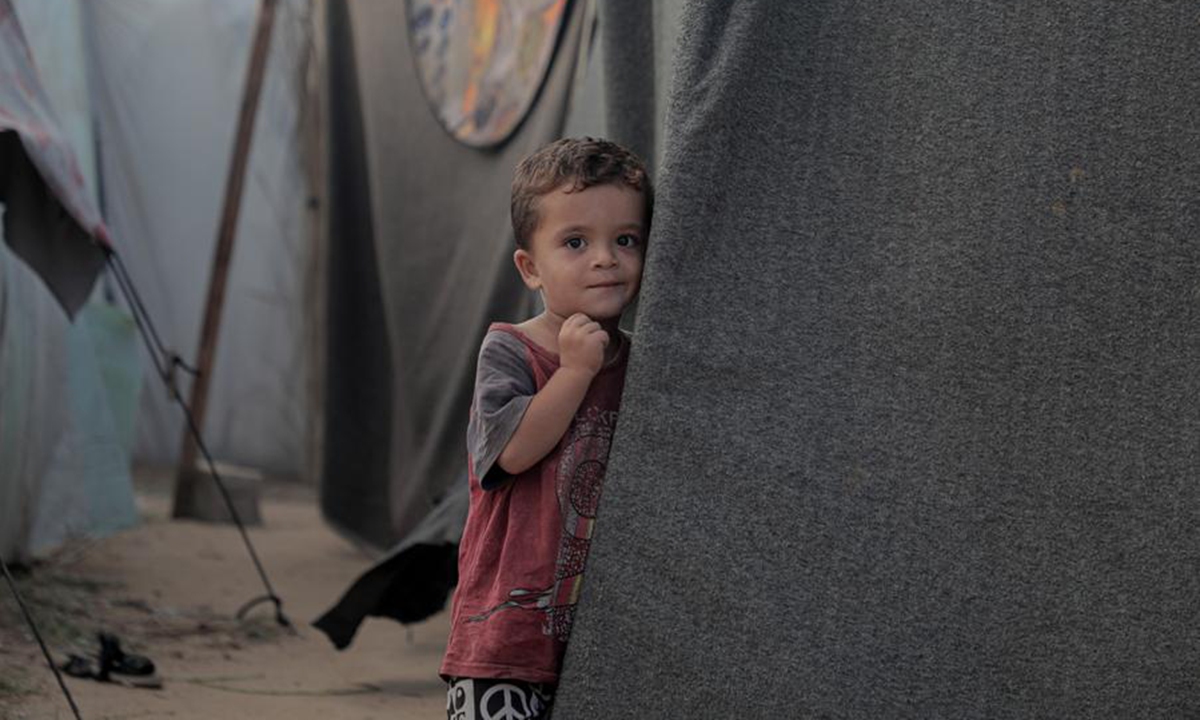
A Palestinian child is seen outside a tent at a displacement center in the city of Deir al-Balah in the central Gaza Strip, on Oct. 5, 2024. (Photo: Xinhua)
The people of Gaza, Palestine, and the broader Middle East deserve a concerted international effort to establish a lasting peace.
As the world approaches the one-year mark of the latest Gaza conflict, the Middle East is spiraling into an alarming escalation of violence, with its nations and factions locked in a deadly cycle of violence that threatens to engulf the entire region.
From Houthi attacks in the Red Sea drawing U.S. military interferences to increased tensions between Iran and Israel, the region teeters on the brink of a wider conflagration.
Beginning in early October, Israel's "limited ground operations" in Lebanon have led to significant civilian displacement and casualties, foreboding an even broader and more dangerous conflict.
These are not isolated incidents: They represent interconnected crises rooted in the ongoing conflict in Gaza. As the Middle East's deadly cycle of reprisal is spiraling out of control, more efforts are needed to exert reason and restraint among regional rivals.
To break this vicious tailspin of violence, the foremost priority must be to halt the conflict in Gaza, which has become a crucible of unrelenting suffering during the past year.
The toll is staggering. In Gaza, nearly 42,000 lives have been lost -- a figure that represents about 2 percent of the population. More than 90 percent of residents have been uprooted from their homes, fleeing time and time again under frequent Israeli evacuation orders in search of safe havens that don't exist.
On the Israeli side, as of Wednesday, more than 1,200 Israelis and foreign nationals (including 46 U.S. citizens in Israel) had been killed as a result of the October 7 attacks, and at least 346 Israeli soldiers were killed in battle since Israel's military began ground operations in Gaza, according to media reports.
This escalating human cost highlights the urgent need for an end to the violence and the search for a sustainable solution.
Yet these numbers, alarming as they are, fall short of conveying the full depth of human tragedy. Families have been shattered, livelihoods erased, and an entire generation of children now bears the scars of trauma. This is the grim reality Gazans continue to face as the conflict rages on, with no clear end in sight.
The international community's response, however, has been woefully inadequate. The United States, in particular, has played a role as morally bankrupt as it is historically myopic. While professing to call for peace, Washington has continued to provide substantial military aid to Israel, effectively enabling the continuation of the conflict.
This unchecked support has emboldened Israel's military adventurism, allowing it to expand its operations with minimal accountability. As Fu Cong, China's Permanent Representative to the UN, pointedly remarked, Israel's decision to escalate its military campaign against Lebanon while world leaders gather at the UN General Assembly calling for peace in the Middle East is "nothing short of a mockery of international justice and the authority of international law."
To disrupt this cycle of violence, the international community must unite and prioritize diplomacy.
China, a consistent advocate for peace, has played a critical role in seeking diplomatic solutions. Over the past year, China has promoted several ceasefire resolutions within the UN Security Council and facilitated internal reconciliation among Palestinian factions. Under Chinese mediation, 14 Palestinian factions met in Beijing for peace talks in July, a rare and significant moment of diplomacy in an otherwise bleak landscape.
At the UN Security Council in September, Chinese Foreign Minister Wang Yi called for an urgent international peace conference, aiming to restart the two-state solution and broker a comprehensive resolution to the Palestinian issue. This proposal has garnered broad international support and offers a credible path toward peace.
As the conflict lurches into its second year, the international community urgently needs to confront the full scale of a humanitarian and security crisis.
The time for half-measures and symbolic gestures has passed. The world must act now to amplify diplomatic efforts and halt the endless cycle of retaliatory violence and hatred.
The people of Gaza, Palestine, and the broader Middle East deserve a concerted international effort to establish a lasting peace.
